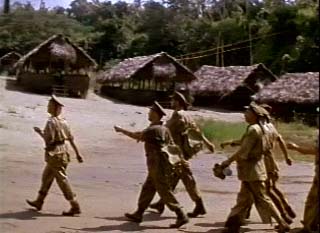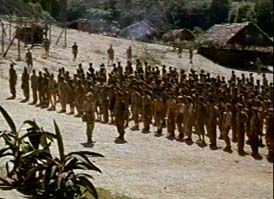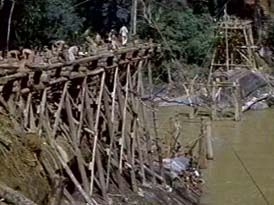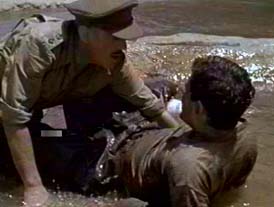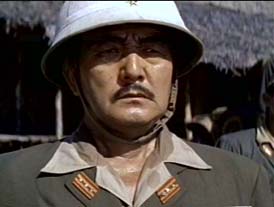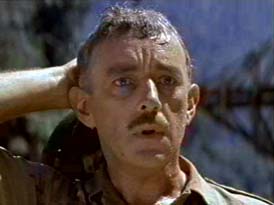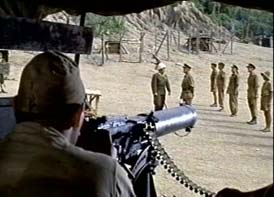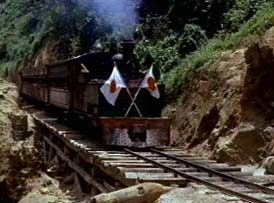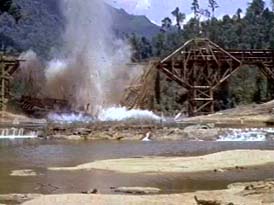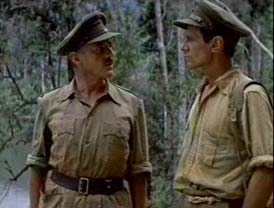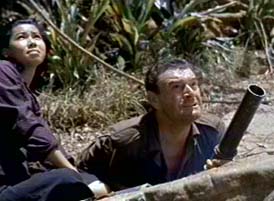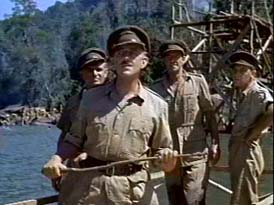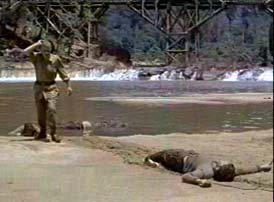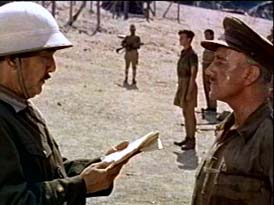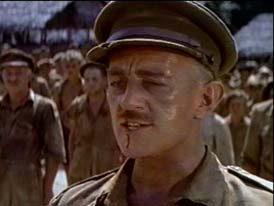|
The basic story involves a group of mostly
British soldiers, fighting to hang on to their dignity in a
cruel Japanese prison camp, run by a Japanese officer, Colonel
Saito (Sessue Hayakawa). Under a forced labor situation, demanded
by the Japanese, a tough British colonel, Col. Nicholson (Alec
Guinness) works his men hard to build a bridge, to keep his
men's morale and Esprit de Corp. up, winning a moral victory
over the Japanese. Unknown to them, British and Allied forces
plan to destroy it, because the completed bridge would allow
the Japanese to move supplies and men up into India, in a place
that would be hard for the allies to bomb and destroy.
The film opens showing the jungle on an island
near India. As the camera pans the jungle, the lens starts to
catch graves with crosses along the railway, which runs by a
Japanese -run prisoner of war camp cemetery. Two rag-tag men,
an American, Major Shears (William Holden) and a Brit, are busy
burying yet another fellow prisoner in the graveyard outside
the prison buildings. The men had all perished from disease,
hard labor and poor conditions foisted on them by the realities
of the camp, and a determined, honor-bound Colonel Saito, who
was willing to do anything to get his work camp assignments
finished. If Saito fails to do so, he is ordered to kill himself
out of the disgrace of failure.
Then, Colonel Nicholson (Alec Guinness), a
disciplined, well-trained commanding English officer marches
his officers and men into the prison camp, all whistling the
"Colonel Bogey March." Upon their arrival Colonel Saito comes
out to greet them, and lays down the law, telling them who is
boss. Colonel Nicholson assures the Colonel that he and the
soldiers will comply, until Colonel Saito insists that both
the officers and men will work side by side to build the bridge,
under the direction of Japanese officers. Colonel Nicholson
boldly asserts that by the Geneva Convention rules, officers
would not do forced labor. After slapping Nicholson, Saito barks:
"Do not speak to me of rules. This is war! This is not a game
of cricket!"
The first struggle of wills between the two
men had begun. Colonel Nicholson was put in solitary confinement
in the "hot box," and his officers were incarcerated as well,
suffering much, all for the sake of an important principle.
If they give in to the brutality and lawlessness of Colonel
Saito, who knows where the brutality will stop?
Meanwhile, while the officers are incarcerated,
Major Shears(William Holden) and two others attempt escape.
While all three men were thought to be killed, Major Shears
escapes and in sad shape stumbles into an island village, where
the people nurse him back to health. They give him a boat to
enable him to escape the island. But, the dumb bunny drinks
some of the river water, and becomes really ill. He is picked
up by a British plane and winds up in a British military hospital
in Celon.
With the deadline for completion coming up
fast, Saito has a serious problem. The men don't work well under
the direction of Saito's Japanese engineers, or even Saito's
direct supervision, and the officers won't break and submit.
Saito, much to his personal shame and distress, finally relents
and takes up Nicholson's offer to let the British officers,
who had built bridges in India take over the construction of
the bridge. While not doing the hard manual labor, the officers
would direct the men to do so, and accomplish the task given,
as an organized, disciplined unit of the British armed forces.
The deal was that Saito would get the bridge built, the men
would receive good treatment, the hospital would stay open,
and the officers would run things in disciplined, civilized
British fashion.
However, one can win the battle but lose the
overall war. One wonders if Colonel Nicholson has invested too
much in the idea of this moral victory, accomplished by building
this bridge with pure British know-how, and seeing it as the
unit's personal achievement under duress, instead of a forced-labor
project to benefit Japan's war effort? Will he be able to step
back without a word when he realizes that someone from the allied
forces is about to blow up the bridge, a symbol of his unit's
backbone and victory over their captors?
Major Clipton, the wise Medical Officer (James
Donald) tries to warn him about the psychological and military
pitfalls about the bridge project, but Colonel Nicholson has
fully rationalized the project as a way to keep the men busy,
get them better treatment, and show the Japanese what a civilized
unit could do.
The bridge's construction of course doesn't
go unnoticed by allied forces. So, while Major Shears is resting
and recuperating in Celon, he is called into service by British
commando department to go with a demolition squad of 3 other
men to be air-dropped back onto the island to blow up the bridge.
Feeling that he has no choice, Shears reluctantly joins this
Demolition Expert Force 316, led by Major Warden (Jack Hawkins).
The gripping screenplay was written by the
talented Carl Foreman and gifted Michael Wilson, which was based
on the original novel by Pierre Boulle. Carl Foreman, a writer
who was black listed in the 1950's, also wrote "High Noon,"
"The Guns of Navarone," "Cyrano de Bergerac," "Young Winston,"
and "Home of the Brave."
Michael Wilson, who was also black-listed in
Hollywood during the 1950's witch hunt for communist sympathizers,
was the writer of the screenplays for "Friendly Persuasion,"
"Border Patrol," "It's a Wonderful Life," "A Place in the Sun,"
"Lawrence of Arabia," and "Planet of the Apes."
This film is another masterpiece that is directed
by the talented director, David Lean, who was the driving force
behind the greatness of this grand epic, filmed on a steamy
jungle location set, including wild rivers and rustic beauty,
with a dynamite cast and a terrific screenplay. Lean's "The
Bridge on the River Kwai" is a classic because it offers an
epic war survival story with gripping situations, intense action
sequences, moments of great courage, great acting, and excellent
photography. The film is perhaps best known for the catchy tune
the British soldier's whistle. The tune, "Colonel Bogey March,"
which was incorporated into the film's memorable score, by Malcom
Arnold, won an Oscar.
The British and American cast did a terrific
job bringing the script to life, in both their solo and ensemble
work. The film offers a fascinating contrast between actors
and nations, as well as acting styles. In many ways it's as
much a battle of acting schools, and styles, as it is about
characters and action.
The marvelous Alec Guinness, who loved to lose
himself in a role, drew upon extensive stage and screen experience
to create his stern, principled stiff upper-lipped colonel,
determined to stand by his deeply-held principles, British military
discipline and for what he thought was best for his men.
Holden, who like all great American stars,
tended to exploit his looks and personality, portrays Major
Shears as an earthy, handsome, vital, and defiant character,
a practical man who naturally does what he has to do to survive,
and will be heroic if he has to, because of various situations
that arise. He isn't so sure that he goes along with the crazy
with courage attitude of the British when it comes to duty and
missions, which both rank higher than individual human life.
While Guinness won the Best Actor Oscar, Holden
more than holds his own with one of the best actors of the British
Empire. Favorite scenes with these two actors happen at the
very beginning when the Colonel has a meeting with Holden and
his officers, and the scenes at the very end of the film.
At the beginning of the film, Holden explains
the reality that exists in the camp. "I'd say the odds against
a successful escape are about 100 to one. But may I add another
word, Colonel? The odds against survival in this camp are even
worse."
Jack Hawkins as the affable but tough as nails,
dedicated British officer Major Warden is convincing. My favorite
scene with Jack Hawkins is the low-key, polite way he good-
naturedly and patiently breaks the news to the soon to be reluctant
volunteer, Major Shears (Holden) why he has to go back to the
island that he just escaped from, and help them accomplish what
they must do. It seems that both the U.S. forces and the British
forces have found out the truth about Major Shears, which sort
of has him over a barrel. Knowing that everyone knows his little
secret, Major Shears changes his tune and attitude of "I've
done my bit," and agrees to volunteer for this high-risk mission.
Sessue Hayakawa was nominated for Best Supporting
Actor for his moving portrayal of Colonel Saito, and one can
see why. He at first is a formidably stern, stubborn foe, who
has to find it within himself to let the British take over the
building of the bridge, when it is evident that the men are
earnestly trying but need their officersâ encouragement and
expertise. Because of the British, he must change his way of
thinking in order to accomplish his orders and survive himself,
as he is stuck as well in the harsh system of Japanese policy,
which was succeed with honor or die.
My favorite sequence of scenes has to be the
last 20 minutes of the film's terrific ending. The human drama
and personal revelations of the main characters, combined with
the terrific shots of the bridge being blown up, and the train
crashing into the drink are quite a satisfying end to this epic
tale.
This film is rated P.G., but may be too emotionally
hard to take for the sensitive, and perhaps a little long in
the middle for the inpatient viewer used to the Star Wars editing
style. This story deals with some unpleasant realities about
Japanese -run internment camps, and about the brutal and senseless
nature of war. On the positive side, this war adventure shows
how the challenges of difficult situations bring out the best
in the resilient human spirit, and shows the charactersâ dedication
and self-sacrifice to a noble cause, as they fight against what
the worst qualities in human nature have created. Hard choices
had to be made, which can either make or break a mission, or
a person. But, this film is highly recommended as a classic
war adventure film, because it looks at both sides of war, the
negative and the positive.
|
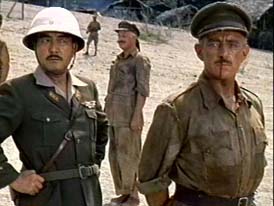
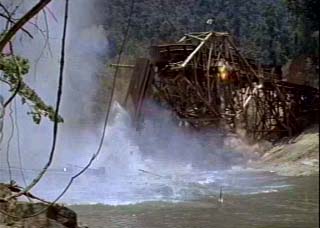
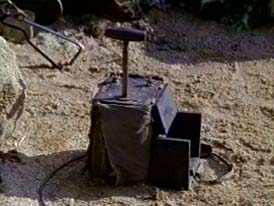
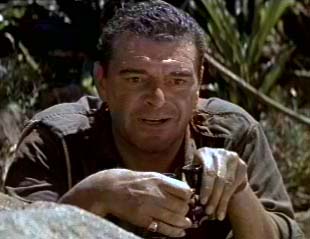
![]()
